- About Us
-
-
About Us
-
-
-

-
“This is an opportunity for our students to provide more for their families, for our students who may not have access to the resources that others do. It’s a blessing for the students who need that support.”
Randall Ward, Director of Student Services, Capital Community College in Hartford
-
- Find Help
- Ways to Give
- Volunteer
- Donate
- Partner Programs
The Harvest

07/Nov/17 / 15:05
Fighting Food Waste
Connecticut Food Bank Gleaning Initiative
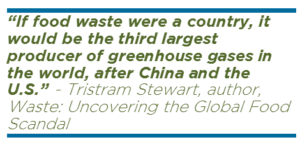 According to National Geographic’s 2016 article, “How ‘Ugly’ Fruits and Vegetables Can Help Solve World Hunger,” nearly 800 million people worldwide suffer from hunger, but one-third of the planet’s food goes to waste, often because of how it looks. In other words, 2.9 trillion pounds of food wasted globally each year is enough to feed each of those 800 million hungry people more than twice over.
According to National Geographic’s 2016 article, “How ‘Ugly’ Fruits and Vegetables Can Help Solve World Hunger,” nearly 800 million people worldwide suffer from hunger, but one-third of the planet’s food goes to waste, often because of how it looks. In other words, 2.9 trillion pounds of food wasted globally each year is enough to feed each of those 800 million hungry people more than twice over.
In North America and Oceania, more than half of the fruits and vegetables grown go uneaten. Of that amount, 20% is lost on farms, frequently for aesthetic reasons: Farmers are often unable to spare the labor and energy required to harvest product that cannot make profit. While unharvested produce may become compost or feed for farm animals, the water, fertilizer, pesticides, seeds, fuel, land, energy and labor that goes into fruit and vegetable production are
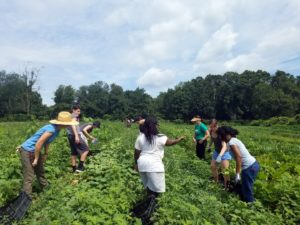
Connecticut Food Bank volunteers work together to pick cucumbers and zucchini at Massaro Community Farm.
no small detail.
The Connecticut Food Bank Farm-to-Pantry Program seeks to redirect excess produce harvested by Connecticut farmers to residents in need, either by way of our 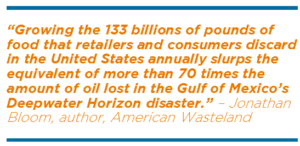 distribution center in Wallingford, or directly to Connecticut Food Bank partner food programs near the donating farm. But what about the produce that doesn’t get picked?
distribution center in Wallingford, or directly to Connecticut Food Bank partner food programs near the donating farm. But what about the produce that doesn’t get picked?
Merriam-Webster defines gleaning as “to gather grain or other produce left by reapers.” Documented as far back as The Old Testament, gleaning is the practice of picking the food that remains in a field after harvest. Gleaning is an important activity that bolsters both the local economy and food system by offering farmers the opportunity to donate more of the produce they cannot sell, and providing communities increased access to fresh, nutritious, and local produce. Robust gleaning programs exist in agriculturally rich states like New Jersey, Vermont and Pennsylvania, but Connecticut agriculture often operates on a relatively smaller scale.
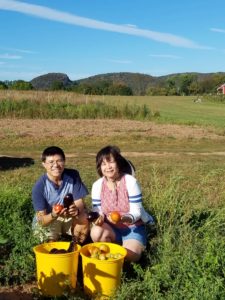
Li Feng and Lili Wei enjoy views of Sleeping Giant while picking eggplant and tomatoes at the Connecticut Agricultural Station at Lockwood Farm.
With the help of volunteer pickers, the Connecticut Food Bank is currently gleaning with three Connecticut farm partners, Massaro Community Farm, Wild Carrot Farm and Connecticut Agricultural Experiment Station at Lockwood Farm. This season, the Connecticut Food Bank has gleaned more than 14,000 pounds of produce, ranging from greens to root vegetables, including kale, bok choy, salad greens, tomatoes, radishes, kohlrabi, eggplant, summer squash, cucumbers and turnips. Large gleanings hauls make their way back to the food bank’s warehouse for distribution to partner programs or directly out to Connecticut communities through the Connecticut Food Bank Mobile Pantry and GROW! Truck. The food bank connects farmers with smaller donations to community food programs in the farm’s area.
Not only is gleaning a great tool for capturing otherwise uneaten produce, it’s a valuable way to engage volunteers from many different Connecticut communities, gathering neighbors to learn about our shared local food system. Through gleaning, volunteers who are usually most familiar with produce as it appears in stores and markets are able to see local fruits and vegetables at their source, meet the farmers growing them and learn about farm work and harvesting.
As we know from our work in the field and can see in last year’s Produce and Programs survey, access to fresh produce is vital and is logistically complex including labor, transportation, and storage challenges. While we work towards living wages and socioeconomic equality, a patchwork of creative solutions and community support and involvement is indispensable in providing increased access to fresh, nutritious, and local produce for all Connecticut residents.
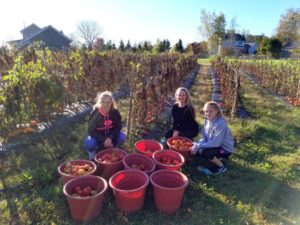
The tomatoes these Wamogo Regional High School students picked from Wild Carrot Farm were donated to local Connecticut Food Bank member pantries.
If your organization is interested in receiving produce donations from a local farmer call (203) 631-2234 or email farm2pantry@ctfoodbank.org for more information.





